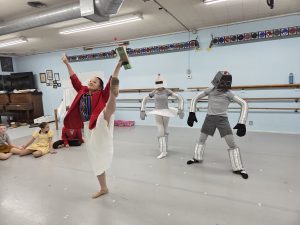
Civilization: Where does it begin and what has been lost in translation? These are the questions explored in Karim Alwali’s new exhibit, “The Civilization Code,” at the Triton Museum of Art.
As a celebrated contemporary artist in Iraq and Jordan, Alwali creates abstract paintings and installations that explore the relationships, memories and similarities of people across the globe.
In “Ziggurat of the Ten Commandments,” 10 squares arranged in a pyramid, tell the story of the 10 Commandments. Across the gallery, a trashcan sits filled with paint, brushes, color plates, cleaning and engraving tools, and other art utensils.

Bar codes are centerpieces around some of Alwali’s pieces. A metal filmstrip with painted drawings makes up “Homeland in the Bag.”
It all means something – the lines and squares, as well as Alwali’s paint strokes and color choices, but it’s up to the viewer to determine his message and how it relates to civilization.
“My paintings begin in the present and end in the past,” is the bold statement written in large font on Alwali’s website. “In my work, I attempt to rediscover ancient form without imitation, by carving and eliminating some elements of the painting: elimination here is a form of addition. This way I assist Father Time in aging my paintings. Using the museum of my imagination and my visual memory. I build paintings after freeing them of their traditional form.”
While the pieces may not be completely covered in paint, it’s often known what Alwali is referencing. In “USA Code,” a blue square lays atop the left corner of the canvas. Red streaks of paint cover the top third, with cream Tetris-style pieces painted throughout. White squares reside in the bottom two corners. Even without the words USA written in the title, it’s clear this piece is an interpretation of the United States flag. While not literal, a viewer can easily put the pieces together to create the image Alwali is portraying in their minds. It’s slightly abstract, but it’s recognizable.
“As an artist I feel that I am surrounded on every side by codes, signs, iconographic symbols, heaven, infinity, movement of the planets, water, fire,” reads the artist’s statement. “In my opinion, visual symbols and vocabulary have existed since ancient times to convey ideas and messages … In this exhibition, I have no solutions to any puzzles nor visual signs or codes, but I intend to raise questions, and I hope that my work can speak while leaving the interpretation to the viewer.”
Alwali left his homeland of Iraq in 2007, fleeing from a threating situation after artists and other unconventional people began to be viewed with suspicion. He was granted asylum in the United States. “I left because it became a miserable situation,” Alwali told the San Francisco Chronicle in 2008. “There was no life – everything stopped. I stopped. No one cared about art anymore. I knew I had to find another way.”
The Civilization Code may reflect his turbulent past while echoing life itself, but that interpretation is up to its viewers. They can determine the meaning of Alwali’s work.
Karim Alwali: The Civilization Code runs through Nov. 23 at The Triton Museum of Art, 1505 Warburton Ave. Visit www.karimalwali.com for more information.












0 comments